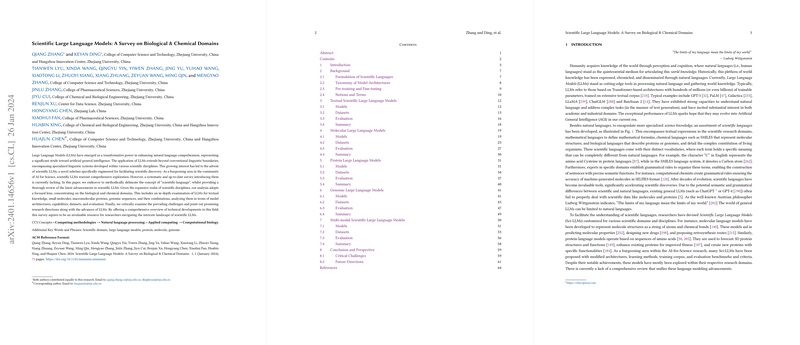Introduction
Scientific LLMs (Sci-LLMs) encompass an advanced subclass specifically crafted for facilitating scientific discovery within the AI-for-Science community. These models delve deep into the field of "scientific language", a term that refers to specialized vocabularies and grammatical constructs developed within scientific disciplines, distinct from conventional natural language. This survey presents an intricate examination of Sci-LLMs, focusing on their roles in the biological and chemical domains.
Data and Model Architecture
A core aspect of Sci-LLM development involves constructing comprehensive datasets for training and fine-tuning these models. Such datasets span textual, molecular, protein, and genomic languages, often surpassing the scope and complexity of standard linguistic systems. Sci-LLMs require robust architectures that can accommodate the idiosyncrasies of scientific data—lengthy sequences in molecular languages, intricate 3D structures in proteins, or the multi-modal nature encompassing text and other scientific entities. To address these challenges, researchers have devised variations on the Transformer architecture, integrating novel attention mechanisms and pre-training strategies.
Training and Evaluation Challenges
The survey notes that despite recent advancements, there are persistent challenges concerning the scale and quality of training datasets. Cross-modal datasets, essential for enabling multi-faceted interactions among different types of scientific data, are particularly scarce and require rigorous semantic alignment. Moreover, evaluating Sci-LLMs poses its own set of complexities, especially for generative tasks where the gold standard remains wet-lab experiments. To circumvent the need for exhaustive experimental validation, developing computational benchmarks and metrics that can reliably predict real-world outcomes is indispensable.
Ethical Considerations
Ethical considerations stand at the forefront, given Sci-LLMs' potential impact on sensitive areas like genomics. Data privacy, consent, bias mitigation, misuse prevention, and equitable access to technological benefits are paramount. Integrating ethical principles within Sci-LLMs is as much a technical challenge as it is a moral imperative.
Future Directions
Looking ahead, the survey suggests seven key research directions to hone the capabilities of Sci-LLMs. Among these, expanding the scale of pre-training datasets and incorporating 3D structural data are top priorities. Equally important is refining the evaluation metrics for models, which will be central to validating the generated scientific entities.
Conclusion
Concluding, the survey lays out both the triumphs and tribulations of Sci-LLMs in navigating the complex landscape of scientific languages. By capturing the essence of biological and chemical domains within a computational framework, Sci-LLMs not only accelerate scientific discovery but also pave the way toward more generalized artificial intelligence.
